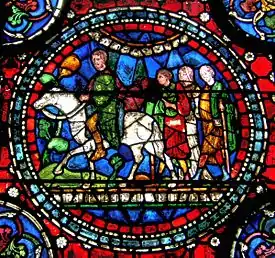palmer
See also: Palmer
English
Etymology 1
From Middle English palmer, from Anglo-Norman palmer, from Old French paumier (“palmer”), from Medieval Latin palmārius (“palmer”), from palma (“palm tree”).
Noun
palmer (plural palmers)
- A pilgrim who had been to the Holy Land and who brought back a palm branch in signification; a wandering religious votary.
- 1674, Thomas Staveley, The Romish horseleech : or, an impartial account of the intolerable charge of Popery to this nation, p. 93:
- The Pilgrim had some home or dwelling place, the Palmer had none. The Pilgrim travelled to some certain, designed place or places, but the Palmer to all. The Pilgrim went as his own charge, but the Palmer professed wilful poverty and went upon alms.
- 1820, John Keats, "Isabella; or The Pot of Basil", I:
- Lorenzo, a young palmer in Love's eye!
- 1674, Thomas Staveley, The Romish horseleech : or, an impartial account of the intolerable charge of Popery to this nation, p. 93:
Etymology 2
From noun palm
Etymology 3
From the transitive verb to palm.
References

- palmer in Webster’s Revised Unabridged Dictionary, G. & C. Merriam, 1913.
Latin
Middle English
FWOTD – 28 March 2017

A medieval stained glass window depicting pilgrims, from the Cathedral of Canterbury, England.
Alternative forms
Etymology
Named for the palm branches they were wont to bring back from the Levant to signify their pilgrimage. From Anglo-Norman palmer, from Old French paumier, from Medieval Latin palmārius (“palmer”), from palma (“palm tree”).
Pronunciation
- IPA(key): /ˈpaːl.mər/
Noun
palmer (plural palmeres)
- A pilgrim who has been to the Holy Land.
- ca. 1370–90, William Langland, Piers Plowman,
- Pilgrims and palmers plighted them together
- To seek for Saint James and the saintes in Rome ...
- Geoffrey Chaucer, Canterbury Tales, General Prologue, ll. 13–15:
- Thanne longen folk to goon on pilgrimages,
And palmeres for to seken strange stroundes
To ferne halwes, kouthe in sondry londes.- Then do folk long to go on pilgrimage,
And palmers to go seeking out strange strands,
To distant shrines well known in sundry lands.
- Then do folk long to go on pilgrimage,
- ca. 1370–90, William Langland, Piers Plowman,
- (by extension) Any pilgrim or crusader.
Norwegian Bokmål
Swedish
This article is issued from Wiktionary. The text is licensed under Creative Commons - Attribution - Sharealike. Additional terms may apply for the media files.